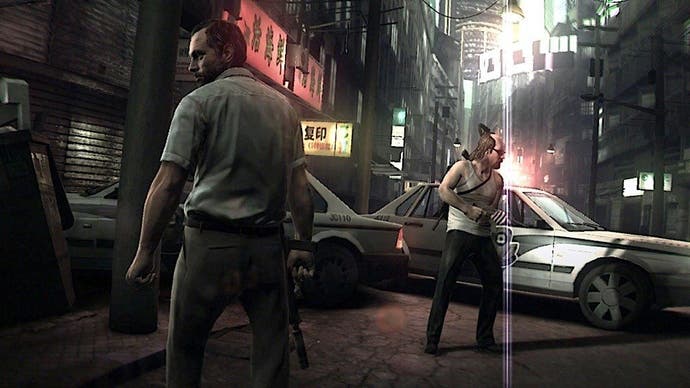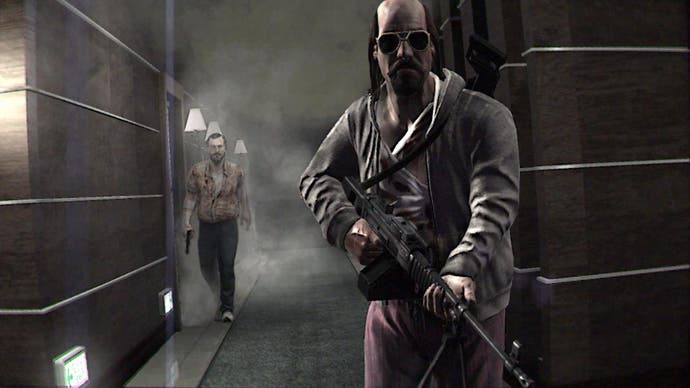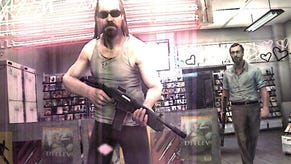Why I Love... Kane & Lynch 2: Dog Days
Low-fi misery.
The camerawork when running presents its own issues as well. Whatever movement algorithm Io came up with has just the right amount of pitch, yaw and bounce, fast and twitchy enough to feel off-kilter and queasy like a bad night of getting pissed at the pub.
I've never really been one to get motion sickness from video games, but Dog Days' shakycam made me want to die (though you can turn it off). Then again, "Real Ain't Pretty" was the slogan used in the game's ad campaign, and it's a phrase that does a great job of succinctly summing up what Dog Days means.
So why would I enjoy - much less love - a game that's so resolute in its unpleasant agenda?
Aside from the actual appearance of its low-res exterior, it's fascinating to see a game let its aesthetics do all (or nearly all) the talking. Dog Days may not always be what I would call fun, exactly, but neither is shining a makeshift light down a pitch-black corridor of the Ishimura after the ungodly shriek of a necromorph breaks the silence from somewhere in the darkness.
Suffering is at the core of the experience Io creates, and just as Kane and Lynch are put through the wringer, the player feels the blindsiding effects of the game's blunt force texture firsthand.
Interestingly, Dog Days is also predicated on denial, in Kane and Lynch's unwillingness to face hard reality, as well as the dubiousness of the arms deal with Lynch's ex-pat boss that has brought Kane to Shanghai.
While the finer points of the deal are never brought up, Kane becomes increasingly insistent that pulling off this last job will be their ticket out, giving him an opportunity to finally hang up the guns for good; Lynch, on the other hand, can (we assume) quit his career as a low-level thug and settle down with his girlfriend, Xiu.

Of course, things go wrong straightaway, when one of the two men accidentally murders the daughter of a corrupt government official (Io intentionally keeps it ambiguous over whose bullet is responsible) who owns the city's law enforcement and does business with an opposing crime lord.
As things continually escalate from bad to worse, Lynch becomes consumed with saving Xiu, who he believes is in danger as a result of this accident, while Kane just wants to meet with Lynch's boss so he can get the hell out of Shanghai.
You would think that being brutally tortured would be a wake up call for both men, but that isn't the case. In the aftermath of being captured by a rival gang boss, Xiu has been raped and murdered and both Kane and Lynch seem near death.
It's obvious to the player at this point that criminal associations in the Shanghai underworld have soured any chance of a deal, but Kane still insists on moving forward with the smuggling job - for either men it seems like the only thing left to do, although Lynch is primarily motivated by revenge at this point.
The phrase "Dog Days" itself suggests stagnation, and Kane and Lynch are both undoubtedly stuck - incapable of existing beyond the confines of criminal behavior and wearing rose-colored glasses about the trouble they find themselves in.

Even when Kane's deal fails to materialise, the two men convince themselves that if they can escape the country that things will somehow be all right. Despite both standing to profit from working together again, neither Kane nor Lynch winds up gaining anything by the end of the game; in fact the outcome is quite the opposite.
The contrasting fantasy of retirement, which the two men seem to believe is real, directly opposes Dog Days' low-grade appearance - no matter what Kane and Lynch may say or think, this is an abrasive and continual sign for the player that these two characters are caught in a continuous limbo of death and despair.
The abrupt editing too leaves little for players to reflect on. Quick, choppy and often cutting in the middle of a scene, the narrative is driven forward in sparse bits that carry almost no impact; aside from actual cut-scenes, what small bites of story remain are presented in bits of grunting dialogue that offers only the slightest ideas of character development against a "buffering" screen.
Ugliness is everywhere, as much as in execution as appearance, and Io relies on it in getting its message across. The ending of the game, which has Kane and Lynch sprinting onto a plane on its way out of Shanghai, abruptly cuts to black shortly after the aircraft takes off, with nothing in the way of dialogue or resolution.
Fused with Dog Days' intentional flaws, the result is a great exercise in nihilistic expressionism - one that reminds us the worst trips through hell are the ones that are ultimately meaningless.

